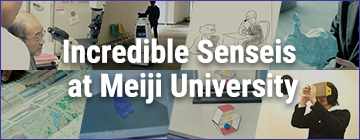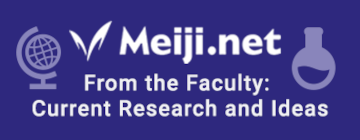Project Summary
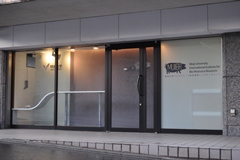
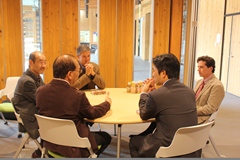
MUIIBR is an international research Institute that is an organic network of domestic and international universities, research institutions and business corporations with Meiji University at its hub. Our purpose is to create, maintain and make use of biological resources based in agricultural science, in particular animal biotechnology, which will contribute to the development of next-generation medical technology.
MUIIBR tackles important issues directly related to human health: developing and verifying new treatment methods for illnesses such as diabetes using pigs as disease models; regenerating or producing organs and tissues through the cloning and genetic engineering of pigs; assessing and analyzing bone and cartilage regeneration processes using genetically modi¬fied pigs carrying fluorescent marker genes; and developing and examining new assisted reproductive technologies (ART). MUIIBR engages in research and development that will make the medicine of the future a reality through translational research using as a platform pigs that have a number of similarities with humans.
MUIIBR tackles important issues directly related to human health: developing and verifying new treatment methods for illnesses such as diabetes using pigs as disease models; regenerating or producing organs and tissues through the cloning and genetic engineering of pigs; assessing and analyzing bone and cartilage regeneration processes using genetically modi¬fied pigs carrying fluorescent marker genes; and developing and examining new assisted reproductive technologies (ART). MUIIBR engages in research and development that will make the medicine of the future a reality through translational research using as a platform pigs that have a number of similarities with humans.
Director’s Message
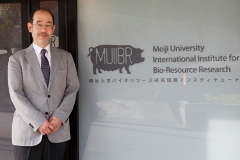
Leading edge medical techniques greatly contribute to the health and welfare of humanity, but there are many challenges yet to be resolved.
Organ transplantation is an effective medical technique to save end-stage organ failure patients, but suffers from the fundamental problem of relying on the availability of organ donors. In contrast, regenerative medicine aims to artificially create the necessary organs and tissues, but it is an extremely difficult challenge against nature to create organs and tissues of complex function and structure by in vitro culture technology. Efforts are underway in the field of regenerative medicine to use pluripotent stem cells such as iPS and ES cells to restore functionally impaired organs and tissue. Needless to say the efficacy and safety of the stem cell therapies must be guaranteed. In addition, assisted reproductive technology, which has advanced remarkably in recent years, is advancing into the areas of the creation of sperm and eggs and genetic manipulation of the embryo, where a keen insight into the mission and nature of scientific technologies is essential.
Against this background, translational research using large animals can be considered essential for the development of leading edge techniques such as organ transplantation, regenerative medicine and assisted reproductive technologies. Translational research is empirical research that bridges the results of basic research to clinical application.
Meiji University International Institute for Bio-Resource Research is advancing translational research relating to leading edge medicine, making full use of cloned pigs and genetically modified pigs that we have developed as unique large experimental animals. It is our aim to contribute to the realization of tomorrow's medicine through translational research using our platform of high value-added pigs.
Organ transplantation is an effective medical technique to save end-stage organ failure patients, but suffers from the fundamental problem of relying on the availability of organ donors. In contrast, regenerative medicine aims to artificially create the necessary organs and tissues, but it is an extremely difficult challenge against nature to create organs and tissues of complex function and structure by in vitro culture technology. Efforts are underway in the field of regenerative medicine to use pluripotent stem cells such as iPS and ES cells to restore functionally impaired organs and tissue. Needless to say the efficacy and safety of the stem cell therapies must be guaranteed. In addition, assisted reproductive technology, which has advanced remarkably in recent years, is advancing into the areas of the creation of sperm and eggs and genetic manipulation of the embryo, where a keen insight into the mission and nature of scientific technologies is essential.
Against this background, translational research using large animals can be considered essential for the development of leading edge techniques such as organ transplantation, regenerative medicine and assisted reproductive technologies. Translational research is empirical research that bridges the results of basic research to clinical application.
Meiji University International Institute for Bio-Resource Research is advancing translational research relating to leading edge medicine, making full use of cloned pigs and genetically modified pigs that we have developed as unique large experimental animals. It is our aim to contribute to the realization of tomorrow's medicine through translational research using our platform of high value-added pigs.
Dr. Hiroshi Nagashima
Professor at the Laboratory of Medical Bioengineering, Department of Life Sciences, School of Agriculture
Professor at the Laboratory of Medical Bioengineering, Department of Life Sciences, School of Agriculture



